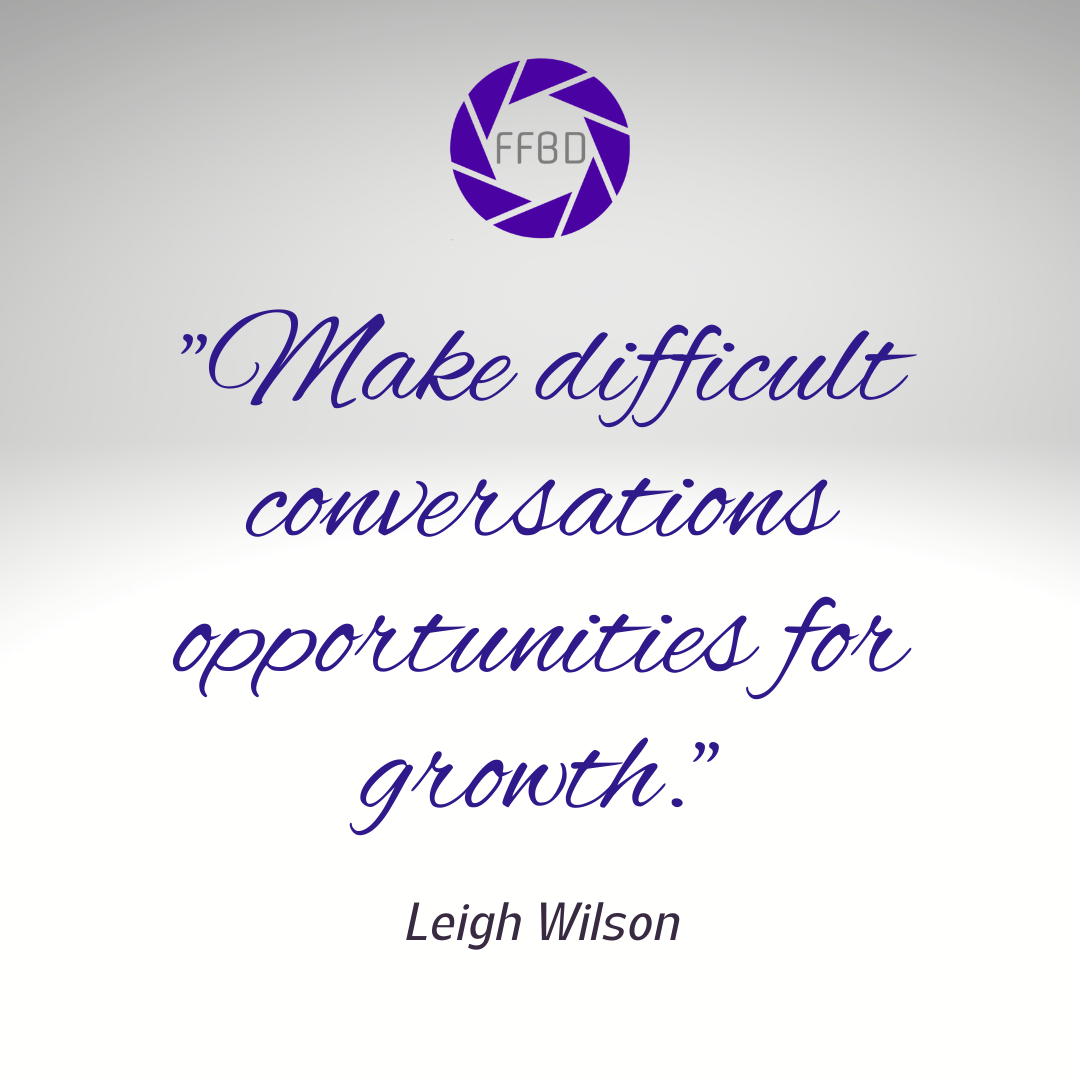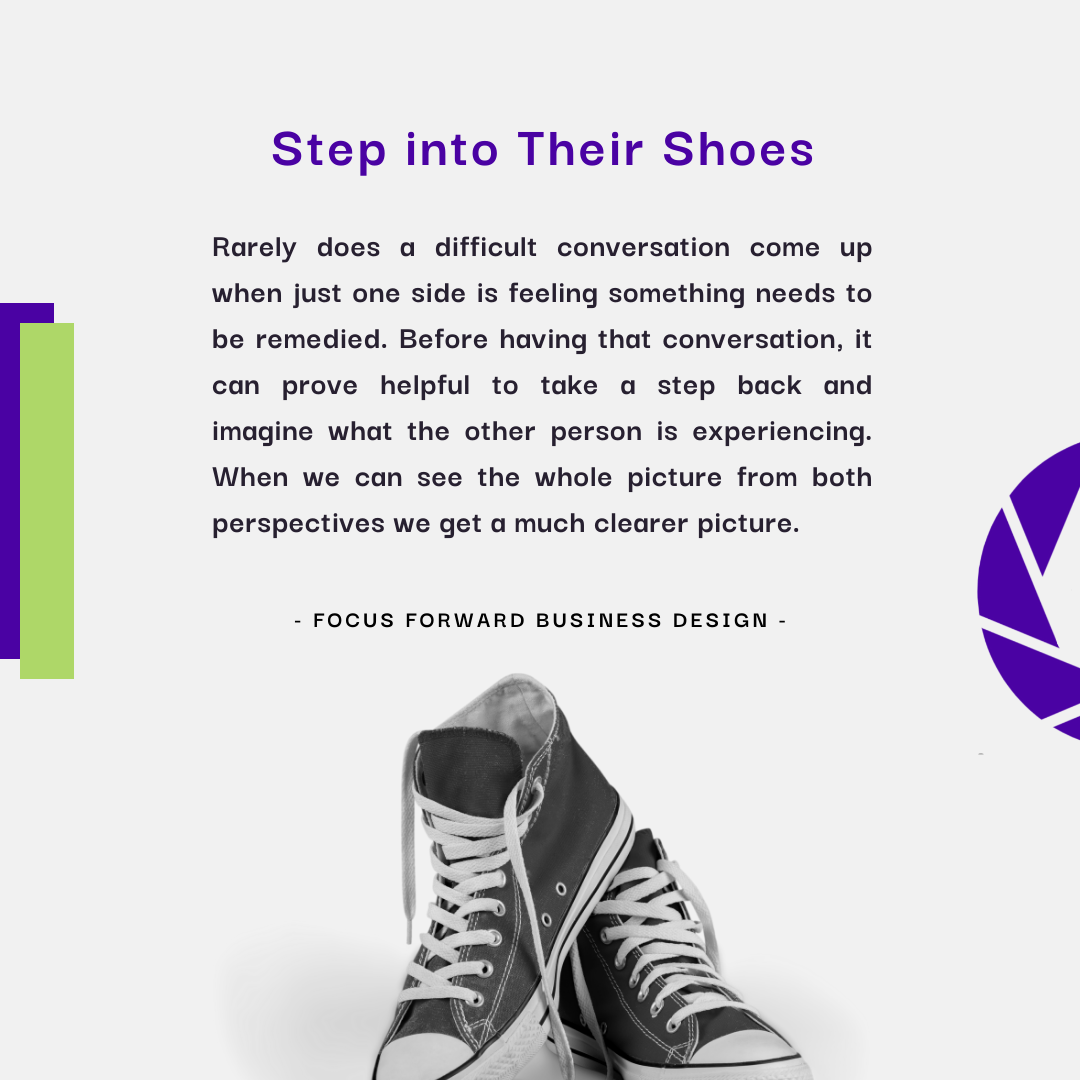Tough Talks
Click below to listen to the podcast!
Summary
- So, what makes us so hesitant and downright sick to our stomachs to have these conversations? The short answer is FEAR.
- We need to stop and reprogram ourselves to envision how amazing the end result is going to be after the tough conversation. You could even go so far as to be excited to talk to this person and have a fresh beginning to whatever the problem may be.
- "Make difficult conversations opportunities for growth."
- Click HERE to sign up for a FREE, no-obligation, One on One Strategy Session with High Performance Coach and Founder of Focus Forward Business Design, Leigh Wilson. Seriously, no pressure, we only want to give you the opportunity to try something you may not otherwise try, and it could completely change your life!
- In this blog, Leigh shares her strategies on dealing with tough conversations, whether it is a spouse, boss, or peer. As a bonus she includes methods for dealing with teens and great tips to keep in mind when communicating to our children.




Full Transcript
Today’s topic is one that I know is really hard for most people, yet it is one that everyone has to confront throughout their lives in order to advance, become a better friend, family member or leader. Sometimes the most important conversations are the most difficult to engage in, but they can be the most life changing.
I am Leigh Wilson, and this is Focus Forward Business Design.
I don’t know about you, but I have a pretty good idea that like myself you are not one that particularly enjoys the thought of having that uncomfortable discussion with someone. It may be your partner, your teenager, a co-worker or even a boss. It just doesn’t matter who it is…it’s just not something that we look forward to, and in fact, will oftentimes push it back, hoping that the situation will resolve itself, or convince ourselves that it's not as bad as we are imagining. What I can tell you, is if you have gotten to the point of thinking about it, and making up excuses not to have the conversation, then it warrants the time and the effort.
So, what makes us so hesitant and downright sick to our stomachs to have these conversations? It’s fairly simple…. fear. We build this event up in our heads to something that is often much larger than it actually needs to be, so we have ourselves scared to death of the outcome. We are scared of losing someone, of being fired, of having our child shutdown or rebel, or making the situation worse or even more uncomfortable. Those are all real fair concerns if we don’t prepare and handle the subject tactfully and with respect to the other person. Unfortunately, what most of us don’t visualize is what the outcome looks like when everything goes just as it should. After all, you know the conversation is needed so that a change can happen…. right? You are not going into this chat with the goal of making things worse, so why would we visualize the worst possible outcome? Because many people are fear based…our minds have been taught to be fear based due to prior experiences in our life. We need to stop and reprogram ourselves to envision how amazing the end result is going to be after the tough conversation. You could even go so far as to be excited to talk to this person and have a fresh beginning to whatever the problem may be. Consider it a strategy session like you would with a team or family planning a new project…the important thing here is that it cannot be one sided. Everyone’s opinions or thoughts matter and they need to know that and feel that. This is what keeps things moving forward so no one person feels attacked.
We have all been in the position of being called into what we considered a superior’s “office”. It could be the principal, the boss, your parents living room or a meeting with your spouse or partner. We walked into the room with our stomach in knots as the invitation was likely not sent with flowers and a pretty invite on linen paper. More likely it sounded something like this “Leigh, we need to talk, please be in my office at 3:00. Or it could be this…you walk into the room and are asked to sit down; we need to talk. No warning at all, just boom let’s do this. Immediately, you are put on the defense. This is not the way to a constructive, forward moving conversation.
Let’s rewrite how these much needed, potentially charged conversations could go. I am going to give you 3 strategies to help you make difficult conversations, opportunities for growth and advancement. Then I am going to give you a bonus of a few tips on talking to teens since we know that can show up as a totally different audience. So, let’s get into this…. take out your journals and be ready to take some notes. I encourage you as we are going through this that if something resonates with you and your mind starts wandering to a personal situation, pause this video and take the opportunity to write out some things that are coming to mind. This will give you the chance to go back and look at those as you are preparing for a conversation in your life that you think may be a little sticky or worse yet, you have been avoiding. Then continue on with the video, in this way you are able to workshop this a bit and really make it relevant to you and improve your world.
- Be clear about how you feel and what your desired outcome is. So often in tough conversations we have ourselves so worked up and so many thoughts running through our heads that we fail to communicate clearly or directly, and the situation just escalates from bad to confusion to potentially worse. If you can carefully plan out what you want to say beforehand you will likely come across as more sincere and less emotional. Begin with telling the other person how you are feeling and what your end goal for this discussion is. It is ok to have a list of notes or keywords with you so that you don’t miss any important points or questions that you wanted to include. Using statements that include “I” instead of “you” show you are taking responsibility and not attacking or placing blame on the other person. For example, “I am feeling really overloaded and don’t feel I can put out the quality that we need and that the team expects, instead of “You are loading so much extra work on me that there is no way I can keep up”. Practice what you are going to say before your meeting…the dog is a great audience, and they won’t whisper a word that you said.
- Step into their shoes – We get so in our heads about how we are affected and how we are slighted that we oftentimes forget that there is another person that is likely feeling that something is unjust in their situation as well. Rarely does a difficult conversation come up when just one side is feeling that something needs to be remedied. Before having that conversation and even as you are preparing what you are going to say, it can prove very helpful to take a step back and try to imagine what the other person is experiencing. How are they viewing the situation that is different from how you are seeing it? You may even want to go one step deeper into how you got into this space in the first place. Is this person going through something personally that is affecting their behavior? Did you do or say something that was construed as hurtful but was never meant that way. When we can see the whole picture from both perspectives, oftentimes it becomes a much clearer picture.
- Be a better listener – The way that we learn is much more often through what we hear vs what we say. This is key in the beginning of the conversation when you are both likely a bit guarded. If they know you are willing to listen, they will be more willing to open up and share. Silence can be a challenge, we all want to jump in and rescue the other side…let the silence ride, it will naturally promote a better more meaningful discussion. Taking the time to listen to the other persons objections or feelings can go a long way in coming to an understanding of what is truly causing the problem. Asking questions and really hearing what the person is saying as opposed to preparing your next argument or statement will open up the discussion and you will likely find that a meaningful discussion starts happening, vs a debate where both parties are determined to be heard and be right.
I promised you a bonus….
What about those teens – I bet that if your teenage years were anything like mine you can remember a few times…probably more than 1 or 2 that you were not the model child and may have been on the other side of a conversation with your parents or another adult that was not very comfortable. If you were the typical teen, you were likely not listening with an open mind, and had a million other things going through your head of which were probably not directed favorably towards the adult. Well, now things have flipped, and you get to be the adult on the other side of the fence, the supposed all knowing wise one. I have been through this side as well, and all I can say is that I now have more respect for those adults that tried to correct my mislead actions, because I now know that they were as frustrated and lost as the teens…The difference is the adults have learned that they themselves still have so much more to learn, and the teens often times think that they are oh so wise.
This is not meant to talk down to our teenage population, as I truly believe that they have so much more to offer up than 90% of the population gives them credit for. However, we as adults must appreciate that having a discussion with a young adult requires different skills than with our co-workers or our life partners. Yet, we don’t give them the credit of being as wise as they truly are, but we expect them to hold difficult conversations at the same level as an adult. By doing this we are sending a mixed message that needs to be clearer and more concise. Are they children or adults, we don’t get it both ways? There is the problem – they are neither.
The strategies that we discussed early need to be a part of our arsenal for our tough talks with teens but let’s look at a couple other things we can add in to make the end result a positive one for both.
- Stay calm – For some reason raising our voices or changing our tone to one that is demeaning seems to be more natural when talking to our children than would ever be considered acceptable when speaking to another adult. Staying calm and asking questions is key to a positive talk. Knowing your topics ahead of time and being prepared with questions that allow your child to express themselves is key. This is a time when being silent can be the hardest but most important piece. Raising the level of trust should always be an ongoing goal so that your teen knows that you are a safe zone and are prepared to listen so that you can jointly come up with a solution. The skill of being able to listen and develop plans together is one of the strongest pieces in developing a long and positive relationship.
- Because we have determined that this has to be a two-way conversation, that by default eliminates lecturing. I know that this may go against everything that you have ever experienced in the adult/teen history of the world, as this has typically been the model. It is time to break the mold. Coming from an area of support and advice can go a long way in letting your teen know that you are here to help and to be a sounding board. Offering advice or sharing a story that has similarities can feel more like friends having a conversation and trying to figure some struggle out, rather than an adversarial strike.
- Finally, it is the toughest one of all…the silence of the wall. Your teen just won’t talk. It happens, we all do it and at the end of the day trust is what will usually break down that wall. This doesn’t happen overnight and especially if you are rebuilding a relationship that has been less than ideal for a while. Often talking about something lighthearted that has nothing to do with either of your frustrations can go a long way. Because you are the adult and likely instigated this rendezvous of sorts you can easily start asking some fun questions that have nothing to do with anything. For example, “If you could do anything that you wanted tomorrow what would you do”? or how about sharing a favorite memory. This may not get you to resolve the issue at hand, but it will begin to form a bond that may not have been there for a bit and in turn communicating will get easier and then dealing with the big rocks will hopefully not be so painful.
I know this had a lot of paths that we went down, but I hope that you are able to pull out a couple of nuggets that will help you the next time that you have to have that difficult conversation. Just remember that avoidance never makes it go away and that the end result to most conversations handled well will result in growth and advancement.
Please share this and of course hit that like button as we try to reach as many people like yourselves that are looking to better themselves.
And as always, remember…It is your choice to Focus Forward!
Want to learn more about Focus Forward?


